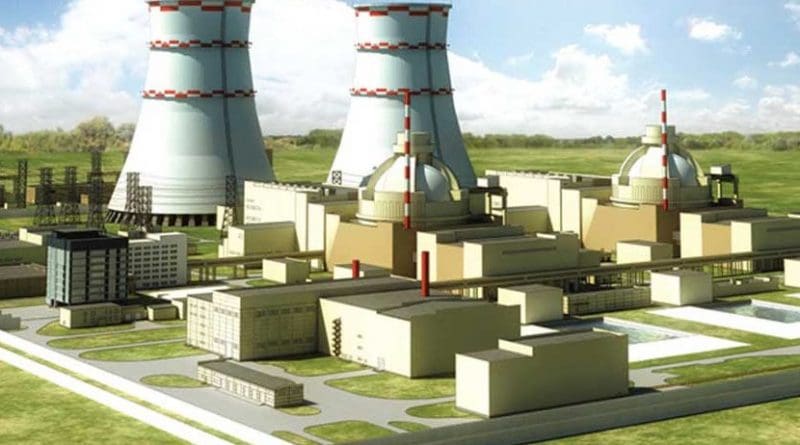Bangladesh Seeks Russia’s Support In Building Second Nuclear Plant
By Pathik Hasan
Bangladesh’s news Agency, UNB writes that Prime Minister Sheikh Hasina on October 11, 2021 sought constant support from Russia for building another nuclear power plant in Bangladesh’s southern region.
Bangladesh has entered the era of nuclear energy. In a video conference from Ganobhaban (BD Prime Minister’s official residence) on October 10, 2021, Prime Minister Sheikh Hasina inaugurated the installation of the first nuclear reactor pressure vessel at the Rooppur nuclear power plant under construction in Pabna district in Bangladesh. The installation of this reactor is considered to be the most important step in the process of commissioning a nuclear power plant.
After Rooppur in Pabna, Prime Minister Sheikh Hasina has sought Russia’s cooperation in building another nuclear power plant in the southern part of the country. She hoped that in the future the Russia’s nuclear agency, Rostom would cooperate with Bangladesh in this regard. The issue was discussed on October 11th, 2021 morning at Ganobhaban when the DG of Russia’s state-owned nuclear agency ROSATOM paid a courtesy call.
Now Bangladesh Seeks Russia’s cooperation in setting up another nuclear power plant.Ever since the original construction began in 2016, Prime Minister Sheikh Hasina has been talking about the state’s plan to build another nuclear power plant in the south of the country. On October 11, 2021, she also spoke in the same context at the installation ceremony of the first unit in Rooppur.
Since the implementation of the nuclear project in cooperation with Russia has come a long way. That is why Prime Minister Sheikh Hasina has sought the country’s help in building the second power plant in the country.
Alexei Likhachev, DG of Russia’s state-owned nuclear agency ROSATOM, met the Prime Minister at Ganobhaban on October 11th morning.
In this courtesy call, the Prime Minister called upon the country to further cooperate in the nuclear sector. Emphasizing the importance of safety, the Prime Minister called upon the Director General of Rosatom to train the local people so that they could run the Rooppur Nuclear Power Plant (RNPP).
At the time, the ROSATOM chief said his country wanted more cooperation in Bangladesh’s power sector. Alexey Likhachev also briefed Sheikh Hasina on the construction and implementation deadline at Rooppur.
Alexei Likhachev said that mutual cooperation between Bangladesh and Russia has entered the nuclear field and by 2023 Bangladesh will become a nuclear power.
He said they would train Bangladeshis to run the RNPP and would continue their cooperation in Bangladesh’s power sector.
Atomic scientists call this reactor the heart of a nuclear power plant. When the construction work is completed, the two units of Rooppur center are expected to generate 2,400 MW of electricity. The construction work of Rooppur project went one step further by installing reactor pressure vessels.
The people of Bangladesh are hoping that the power generation will start after the completion of the project as per the schedule. The Rooppur project will have two units of VVR-technology reactors with a capacity of 1,200 MW. According to the schedule, Unit-1 is scheduled to be launched in 2023 and Unit-2 in 2024.
“Once the Rooppur Nuclear Power Plant (RNPP) is completed, we’ll go for setting up another in the southern region of the country. We need constant Russian support in this regard,” she said during a meeting with Rosatom State Atomic Energy Corporation Director General (DG) Alexey Likhachev at Ganabhaban in Dhaka.
Briefing the reporters after the meeting, the prime minister’s Press Secretary Ihsanul Karim said Likhachev also expressed his country’s willingness to continue support to Bangladesh’s power sector.
Rooppur power plant in Pabna, which consists of two units with a capacity of 1,200MW each, is the first nuclear one in Bangladesh. The project is being implemented by the Bangladesh Atomic Energy Commission and built with Russia’s technical and financial support.
The prime minister on Sunday had inaugurated the reactor pressure vessel installation work of the plant.’
During meeting with Likhachev, she emphasized the importance of maintaining appropriate security measures in the plant and asked him to train Bangladeshi people in this regard.
She appreciated Russia for extending its help to construct the first-ever nuclear power plant in Bangladesh.
Talking about the Covid-19 pandemic, Hasina said the pandemic has slightly slowed down the country’s overall development, and Bangladesh is now in the process of recovery.
She recalled with gratitude the assistance and cooperation of the then Russian Federation during Bangladesh’s Independence War in 1971 and rebuilding the war-ravaged country.
The Rosatom DG highly appreciated Hasina’s strong support and guidance towards RNPP and said the cooperation between the two countries has entered an atomic sphere.
“Bangladesh will become a nuclear energy power by 2023,” he said.
Describing the present status of the project, he said: “We’ve all the technical aspects and the security measures into account.”
About the completion of the ongoing project, Likhachev said the timeline may be adjusted.
Regarding training, he said they will train Bangladeshis to run the plant and will also give attention to social development in the project area.
He said more than 20,000 Bangladeshi people are working on the project while some local companies have been given various jobs on sub-contracts. “They’re remarkable.”
The Rosatom DG also praised and thanked the Science and Technology Ministry and Atomic Energy Commission for their all-out support and cooperation.
He also thanked the Health Ministry for its cooperation in vaccinating 90% of the Russian nationals working in the project.
According to UNB, Science and Technology Minister Architect Yeafesh Osman, Ambassador-at-Large Mohammad Ziauddin, Principal Secretary Dr Ahmad Kaikaus and Secretary of Science and Technology Ministry Ziaul Hasan were also present at the meeting.

